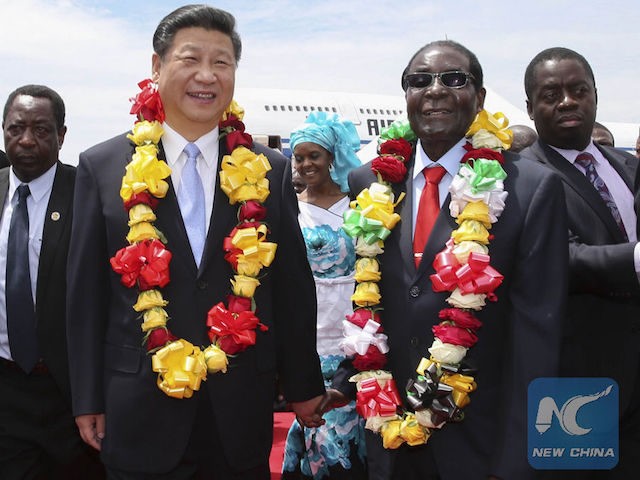Chinese state media, which have routinely promoted its ties to Zimbabwe, published a story on Monday arguing that the Chinese government had long ago began divesting from Zimbabwe as the operation to remove 93-year-old dictator Robert Mugabe continues to generate world headlines.
“Even before the military takeover, Chinese investment in Zimbabwe had been dwindling,” an article in the Global Times on Monday boasted in its title. The article goes on to claim that China’s trade ties with the African nation “had already been dwindling due to low profitability and high political risks.”
While acknowledging that “China has dozens of infrastructure projects currently taking place in Zimbabwe” and “Chinese experts and businessmen in Zimbabwe say China’s investment in Zimbabwe will not be affected by the current crisis,” the Global Times goes on to disparage Zimbabwe’s economy and claims that Chinese lenders had reservations about the country’s financial stability.
Experts cited in the piece claim that China had already begun withdrawing investments from Zimbabwe because of “Mugabe’s recent strict policies on trade and foreign investment.” The piece went on to cite African outlets’ reporting that many Chinese infrastructure projects in the nation had been “put on hold” before the military attempted to depose Mugabe last week.
China remains the largest investor in Zimbabwe. The Global Times published an extensive feature on China’s investment in African infrastructure four days ago.
Military officials took to the airwaves in Zimbabwe last week to announce that they were acting to remove “criminals” from the highest levels of power and that their act was not a military coup. The military allowed an anti-Mugabe protest in Harare, the capital, on Saturday and organized a public speech in which Mugabe was scheduled to step down. Mugabe refused to leave the presidency, however, prompting his ruling Zanu-PF party to begin impeachment negotiations.
The Global Times appears to argue that China’s investments in Zimbabwe will survive, even as they “dwindle” because it is Mugabe’s trade policies they oppose while having a good relationship with the military. The newspaper also claims a working relationship between China and Emmerson Mnangagwa, the ousted former vice president whom the military appears to be seeking to install in the presidency. Yet Mugabe has long enjoyed very close ties to the Chinese Communist Party (CPC), broadcast loudly in Chinese state media.
The Chinese state outlet Xinhua published an interview with Mugabe on October 27 in which Mugabe “praised China for maintaining friendly relations with Africa and the developing world at large.”
“The independence, the sovereignty we enjoy would not have come that easily were it not for China,” Mugabe told the outlet.
China awarded Robert Mugabe the “Confucius Peace Prize,” a Chinese state competitor to the Nobel, in 2015.
Mugabe, in turn, is one of the few world leaders to support China’s illegal claims in the South China Sea, dismissed by the Permanent Court of Arbitration at the Hague. Zimbabwe does not make any claims in the disputed territories of the South China Sea.
Xinhua declared China Zimbabwe’s “all-weather friend” in April in a story celebrating Zimbabwe’s Independence Day. “Today, relations between the two countries continue to grow on the political, economic and cultural fronts,” Xinhua declared seven months before the Global Times would claim dwindling ties between the two states.
Four months before the Global Times‘ dismissal of Zimbabwe, Xinhua announced that more than half of Zimbabwe’s foreign direct investment in 2015 came from China.
“Chinese investment in agriculture has to a large extent sustained Zimbabwe’s tobacco industry through the outgrower scheme operated by Chinese firms,” one expert told Xinhua.
While the Global Times appears to be attempting to reassure the world that China’s ties with Zimbabwe are minimal, the Chinese Foreign Ministry has kept to broad statements of support for the people of Zimbabwe during this turbulent time.
“We sincerely hope that the situation in Zimbabwe will become stable and the issues will be resolved peacefully and appropriately,” Foreign Ministry spokesman Geng Shuang said on Friday.

COMMENTS
Please let us know if you're having issues with commenting.